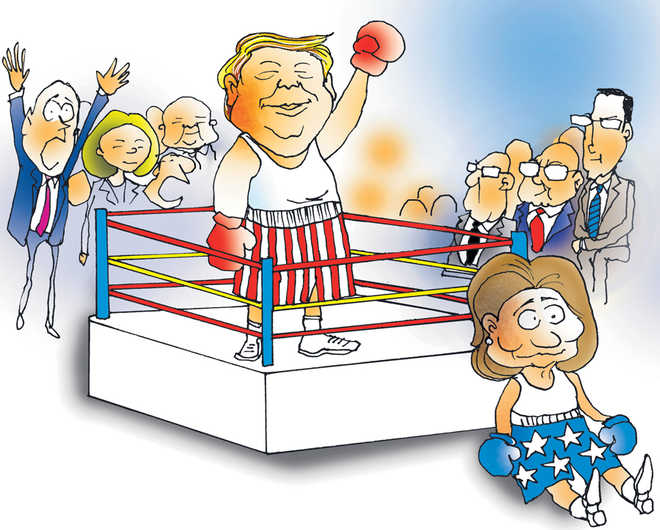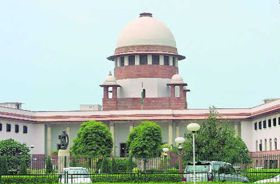
Illustration by Sandeep Joshi
Harish Khare
In his masterly study, The American Character, first published in 1944, Professor D.W. Brogan had spoken of how “the American experience” had bred, among other attitudes, a preference for “the temper of the gambler” in the new settlers in North America. In the 2016 presidential contest the Americans abundantly gave in to that temper of the gambler when they voted in as President a man who defied every known parameters of eligibility, competence and character. The rest of the world may find this gamble distasteful but Donald Trump did devise a campaign that catered to the Americans' visceral fears and anxieties. Simply put, Trump is truer to the American character than his rivals and adversaries.
In the 1956 edition of The American Character, Professor Brogan had explained and elaborated why the Americans fell for Senator McCarthy and his manic witch-hunting: “He (McCarthy) was, obviously, a symptom of the uneasiness with which the average American watched a world get out of hand and dangerous to a degree that the human race had never known.” McCarthy had tapped into those fears of the Americans and he was particularly successful because he was also appealing to “a tradition of rural radicalism”, which, according to Brogan, included “a faintly concealed anti-Semitism.” Trump had managed to ignite all the ancient and dormant prejudices and passions that rural Americans had long nurtured. Persistently and consistently, his campaign kept honing in on the under-educated, under-employed white male voter and his ugly resentments. And, now we know for sure that very, very many Americans had never cured themselves of those dark attitudes and reflexes of the early 1950s.
Perhaps another way to understand the 2016 American presidential vote is to see it as a joyful rolling back of the post-Watergate morality. When the Americans kicked Richard Nixon out of the White House, they settled for a comfortable assumption that they have exorcised themselves of all the low cunning and baser instincts that man had come to represent. The Democrats/liberals/the “Rockefeller Republicans all strutted that “decency” and “openness” and “truthful” had been restored as core values in the working of the United States government at home; and, they asserted that “human rights” and “democracy” and “dissent” should be the guiding principles of American foreign policy. The policy elites among the Republicans and the Democrats behaved as if they had stumbled upon the magic potion that would cure their domestic politics of all its deficiencies as well as entitle them to preach to the other nations how to conduct themselves, at home and abroad.
That post-Watergate morality eventually turned sour, especially for the white Americans. Openness brought in too many immigrants who became too ubiquitous as they excelled and outpaced the white Americans in the competitive arenas across the American society and economy. That was not all. The “professional politicians” and their accomplices in the media and entertainment industry had conspired to elect a black man to the White House in 2008. That, dear sir, was nothing but a blasphemy. And, now they wanted a woman to be the “Commander-in-Chief.” No way. That would not be allowed to pass.
The Americans are obviously tired of political correctness. They seem to be particularly tired of liberals and their fashionable sentimentalities. The liberals themselves have not always behaved honourably or honestly; hence, Ms Clinton's all too obvious “trust deficit.” More than that trust deficit was the “I-am-like-that-only-and- you-have-to-take-it-or-leave it” attitude that, apparently, did not impress that many voters, not even the women voters. On the other hand, Trump did not allow himself to be cramped within the confines of the party system and its corrupted political morality; he mounted an insurgency —first, in the Republican Party and then in the United States at large.
Each presidential election becomes an occasion to revisit what kind of society the Americans want, or should be allowed to have. The quintessential American character has reasserted itself. They are happy to fall for the resentful nationalism that Donald Trump doled out to them. Take a sample. Two days before the vote, on Sunday, Trump was in Minnesota telling a crowd: “To be a rich nation, we must also be a safe nation, and you know what’s going on here. The whole world knows what's happening in Minnesota. Here in Minnesota, you've seen first-hand the problems caused with faulty refugee vetting, with large numbers of Somali refugees coming into your state without your knowledge, without your support or approval, and with some of them then joining ISIS and spreading their extremist views all over our country and all over the world.” And, then, he hopped over to Michigan, which has a sizeable Arab population, and told his supporters how the same faulty refugee vetting had “put your security at risk” and how “it puts enormous pressure on your schools and your community resources.” Both these states, traditionally inclined to vote for the Democratic column, ended up witnessing very close contests.
Each presidential election also reaffirms old fault-lines as well as introduces new ones. The Trump campaign got its seemingly indefatigable energy from thinking of itself as a movement, out to overthrow the established order; in particular, the “religious right” lined up its fanatical exertions behind the Trump banner. The conundrum, then, becomes how will the new President accommodate and appease this worked-up fringe; as a matter of fact, the “fringe” is perfectly within its right to think of itself as the new “centre.”
Donald Trump cannot possibly pretend that these inspired mad caps did not provide a substantial push to his journey to the White House; nor can he abandon them or ignore their preference in making key appointments and then in crafting policies. Were he now to move to the “mainstream” and “centre”, he would not only invite the charge of political dishonesty and intellectual duplicity but he also run the risk of invoking their fury.
Donald Trump’s victory is not just a negative vote, aimed at preventing that “crooked Hillary” and her equally unlovable husband from coming anywhere near close to the White House; it is a positive vote, tapping the white Americans’ raw anger, promising to rewrite the Washington rule-book to suit the American character.
It is not that this presidential vote has changed America overnight. The change had been in the making for some time. The vote clearly means that the Americans have abandoned their engagement with liberal imagination that began in 2008. The Obama experiment has left a bad taste in the American mouth. The Americans were itching to go back to the roots. The 2016 contest has merely re-aligned the presidential politics with the American society and its passions and prejudices.



























